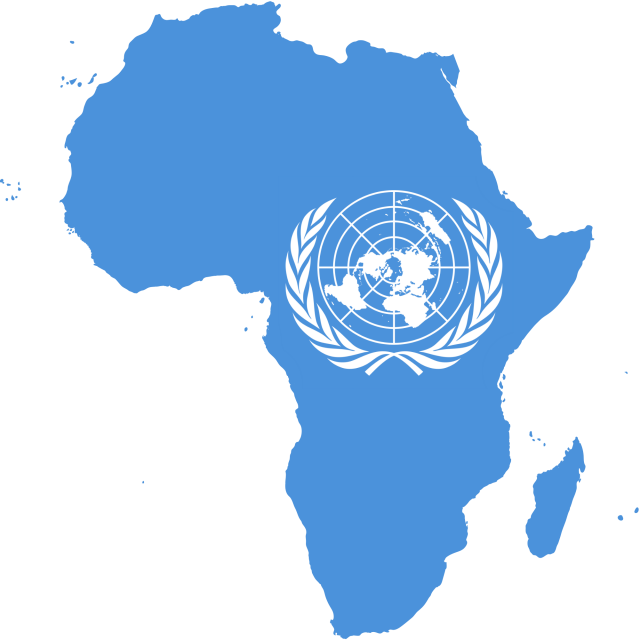United Nations in Africa
Created after World War II, the United Nations (UN) is an international organization that promotes peace and security among member states and cooperation on economic, social, cultural, and humanitarian issues. When the UN was founded in 1945, only four African countries were independent states and members of the organization: EGYPT, ETHIOPIA, LIBERIA, and SOUTH AFRICA. By 2000 more than 50 African countries had joined the United Nations.
As members of the United Nations, African states have a voice in international affairs, debating issues affecting member states and providing support for various UN programs. African nations have perhaps their most important role in the General Assembly, the branch of the United Nations consisting of all member states. The General Assembly discusses and makes recommendations on issues under consideration by the organization.

Role in Africa
The United Nations has a significant impact on African countries through its policies and the activities of its agencies. In its role in promoting world peace and security, the UN has been active in many of Africa's trouble spots. It has intervened or acted as a negotiator in numerous wars resulting from the struggle for independence and in internal conflicts. In 2000 it had three major peacekeeping operations in Africa: in CONGO (KINSHASA), SIERRA LEONE, and WESTERN SAHARA.
The United Nations is also involved in economic development activities in Africa—the least developed region in the world. Economic development involves increasing the efficiency and productivity of a country's economy and improving the living conditions of its people. Nearly all UN development agencies play an active role on the continent. A special agency, the United Nations Economic Commission for Africa (ECA), was created in 1958 to assist African states in their efforts to improve and expand their economies.
UN Agencies
UN agencies provide a variety of different services in Africa, from food and economic assistance to education and financial advice. The ECA works to promote economic cooperation among African nations, raise the level of economic activity in each country, and increase the standard of living of African peoples. Each of the agency's divisions focuses on particular issues, such as agriculture, industry, trade, natural resources, transportation, and communications. The ECA has also played a key role in bringing the plight of African countries to international attention.
Created in 1965, the United Nations Development Programme (UNDP) works to help UN member nations around the world with their development efforts. The agency is the largest source of technical support for developing countries worldwide. Assistance usually consists of providing experts, equipment, and training. One of the agency's programs, the United Nations Capital Development Fund, focuses on small-scale development projects such as building irrigation systems, roads, and housing in poor communities.
The United Nations High Commissioner for Refugees (UNHCR), established in 1951, assists REFUGEES displaced as a result of war, social unrest, or persecution. The agency offers protection for refugees, ensuring that they are treated according to international guidelines. It also provides refugees with emergency food, shelter, medical care, education, and counseling, as well as assistance with resettlement in their homelands or in other countries. UNHCR was particularly active in Africa in the 1990s, when millions of refugees were forced to leave their homes in SOMALIA, ERITREA, RWANDA, and other countries because of famine, ethnic violence, and internal strife.
Established in 1945, the Food and Agriculture Organization (FAO) is dedicated to raising levels of nutrition and standards of living by improving the production and distribution of food and other agricultural goods. In Africa the FAO has worked to change agricultural policies, conserve the environment, and develop institutions and infrastructure to support increased production. The agency provides both technical assistance-—such as distributing seed samples and fighting soil erosion—and training.
The World Bank, also known as the International Bank for Reconstruction and Development, is a specialized UN financial agency. In the 1990s it was Africa's largest source of loans. The bank also provides research grants and technical advice and training related to its loan projects.
Other UN agencies that play an active role in Africa include the United Nations Environment Programme (UNEP), the United Nations Population Fund (UNPF), the United Nations Children's Fund (UNICEF), the World Health Organization (WHO), and the United Nations Educational, Scientific, and Cultural Organization (UNESCO). (See also Annan, Kofi; Development, Economic and Social; Global Politics and Africa; Human Rights.)